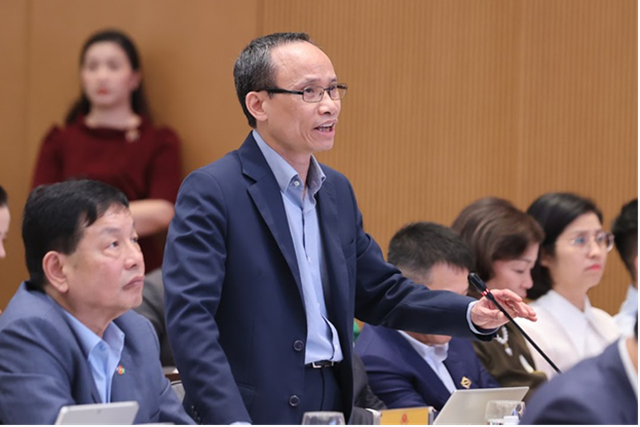At the seminar with businesses and business associations to effectively implement Resolution 68 of the Politburo, chaired by Prime Minister Pham Minh Chinh on May 31st, Dr. Can Van Luc proposed seven key issues and recommendations for private sector development.

Firstly, Resolution 138 by the Prime Minister, Resolution 198 by the National Assembly, and most recently, Resolution 139 by the Prime Minister, provide crucial orientations that need to be implemented synchronously.
Secondly, it is imperative to promptly issue a decree on support mechanisms for household businesses transitioning into enterprises. This includes implementing appropriate tax policies, recognizing their significant role and contributions, as they currently account for approximately 23.5% of Vietnam’s GDP.
Thirdly, there is a need to expedite amendments to essential laws, including the Law on Supporting Small and Medium-sized Enterprises, the Enterprise Law, and the Bankruptcy Law. This will create a more conducive legal framework for the development of Vietnamese enterprises. Simultaneously, enhancing the role of business associations and working towards legalizing their activities is highly anticipated by the business community.
Mr. Luc pointed out that some localities are reorganizing their district-level administrative units, which has created challenges for district-level associations and federations, especially in Ho Chi Minh City and Hanoi. He urged the Prime Minister to provide timely guidance to address these challenges.
The fourth recommendation focuses on effectively implementing support measures for businesses and household enterprises, particularly in areas such as land, science and technology, capital, human resources, and transitioning towards sustainability and green growth.
In this regard, Mr. Luc proposed two key solutions: Firstly, developing a more balanced financial market, especially the corporate bond market and the stock market. He urged the government to continue efforts to upgrade Vietnam’s stock market ranking this year, as per the Prime Minister’s direction. Additionally, establishing international financial centers in Ho Chi Minh City and Danang with suitable approaches will foster new growth dynamics for the economy.
Secondly, he suggested the Prime Minister approve the establishment of a credit guarantee fund at the central level and reactivate 28 local credit guarantee funds for small and medium-sized enterprises. Moreover, the early establishment of a green transition support fund, offering a 2% interest rate subsidy for green transformation enterprises, is imperative. Simultaneously, promoting venture capital funds is crucial, as they are the primary source of capital for science, technology, and digital transformation, rather than relying solely on traditional bank credit in these sectors.
Fifth, it is essential to engage prominent private enterprises in implementing key national programs and projects. Support should be based on enterprises’ actual contributions rather than solely on their scale. This approach fosters the development of robust indigenous enterprises that play a leading role in the economy.
The sixth recommendation emphasizes practical connectivity support for businesses. At the recent ASEAN Forum, one of the four pillars of cooperation was “connectivity.” We need to innovate our trade and investment promotion methods, adopting a focused, proactive, substantive, and effective model.
Additionally, enhancing support for Vietnamese businesses investing abroad is vital for expanding their development space and elevating the country’s economic stature internationally.
Regarding public debt, Mr. Luc acknowledged the government’s prudent policies and approaches. However, he emphasized the need for substantial improvements in implementation to ensure effectiveness.
Seventh, completing the system of indicators, statistics, and data for the economy in general and the private sector in particular, is essential. Currently, data and indicators are inconsistent and sometimes contradictory across agencies, hindering effective governance, especially in the context of the digital economy, where accurate and synchronized data is a prerequisite.
Finally, Mr. Luc highlighted the importance of Resolution 68-NQ/TW’s solution, which focuses on building a capable, cultured, law-abiding, and ethically-driven business community. This is not only a requirement of the times but also a strategic imperative set by the Party and the State for the business community’s sustainable development and international integration.
– 20:02 05/31/2025
No Criminalization of Economic and Civil Relations: Experts Urge for a Necessary Step
“Deregulating and reducing the number of conditional business sectors is key to curbing over-criminalization. By simply deregulating one conditional business sector, numerous binding regulations and accompanying procedures can be eliminated,” stated the former Vice Chairman of the National Assembly’s Committee.
“The Chairman of Hoa Phat Group Emphasizes on Prioritizing Domestic Production: A Mandate for Government Projects”
“Mr. Tran Dinh Long, Chairman of Hoa Phat Group, has proposed that all public investment projects, such as highways, should have a minimum of 70% domestic content. This bold suggestion highlights the potential for local manufacturing and the opportunity to reduce reliance on imports. With a strong belief in the capabilities of Vietnamese industries, Mr. Long envisions a future where local products take center stage in national development, paving the way for economic growth and a more resilient Vietnam.”
A Southern Giant Eyes Northern Expansion with Land Acquisitions
“Vietnam’s leading real estate developer, Nam Long, has set its sights on expanding its reach to the northern market. With an ambitious vision, the company’s subsidiary, Nam Long ADC, is spearheading this endeavor by introducing an affordable housing project, marking their first venture into this region.”





















